And there is really no good news for oil price. The forces driving the decline are not going away. Shale oil production continues to rise as technology has driven the breakeven cost down … so while shale oil might have needed $70 five years ago (and got $100), it only needs $40 now. And OPEC is either unable or unwilling to cut back production to keep prices high. This is not a big surprise as countries like Libya, Iraq, and Iran must see their production rise if they are to have the resources to cope with their challenges. And the two OPEC giants – Russia and Saudi Arabia are fiscally stretched and don’t want to lose share.
Looking out a bit further, it is hard to see any future in oil. Advances in renewables are extraordinary – in fact, in Germany there was a day this month where wind and solar supplied 85 per cent of the energy … extraordinary in a country that does not have much sunshine! And climate change (and the need to reduce carbon emissions) is firmly on the agenda despite Trump, so the pressure to reduce carbon energy sources will only build.
What does this mean for us in Nigeria? Despite all the talk of the need for diversification the last three years, we are still going far too slowly. I am not sure there is a visceral understanding in the political class of how shaky the oil foundation is and how urgently we need to act. We obviously got some (small) respite with oil in the $50s, but now we are back in the low $40s, with the budget price of $42.50 … and if it sinks to $30 or lower in the next few months (which could very well happen), we are going to end up in the 2016 world of pain again.
So what to do? Well, here is a modest suggestion (note that is entirely a personal view, not a PwC view!). My suggestion comes from the success of the Canadian model, where all the mineral and oil/gas wealth belongs to the province, not the federal government. To be sure, the Canadian Federal Government benefits from a small royalty, and from income taxes when incomes are rising due to natural resource wealth, but it is the province that decides the development, sets the royalty rates, grants the licenses, etc. Provinces that decades ago were below the national average income have done very well in the last 20 years – Newfoundland, Saskatchewan, Alberta (though even Alberta has suffered from oil price drop).
So given that oil is likely to go lower and lower (which means what many in Nigeria call a cake, and which I call a cupcake, is going to soon be small cookie), how about Nigeria announce a similar policy, with a suitable transition period. So we could say that in 2032 (15 years from now), all oil and gas wealth will be managed at the state (or whatever structure we have) level, and we make the transition 1/15th every year between now and then.
What would this accomplish? Well, for the states with oil, they now know that the oil wealth will eventually be under their control, so they do not need to agitate for it. For the non-oil producing states, it would send a very clear signal that they better get their own economies going, because the cupcake/cookie is definitely disappearing for them, regardless of oil price.
Thinking about it a bit more, how about considering putting this policy in place now for mineral wealth. We have talked a lot about metals and minerals the last few years, but the reality is we have not made much progress. And the policy regime announced not too long ago is similar to oil, with the FG controlling the development, and a small 13 per cent derivation payment to the states. Given the challenges this approach created in the oil and gas industry, how about we try the approach where the states control the mineral wealth. It is worth considering.
Dr Nevin is Chief Economist, PwC, West Africa






